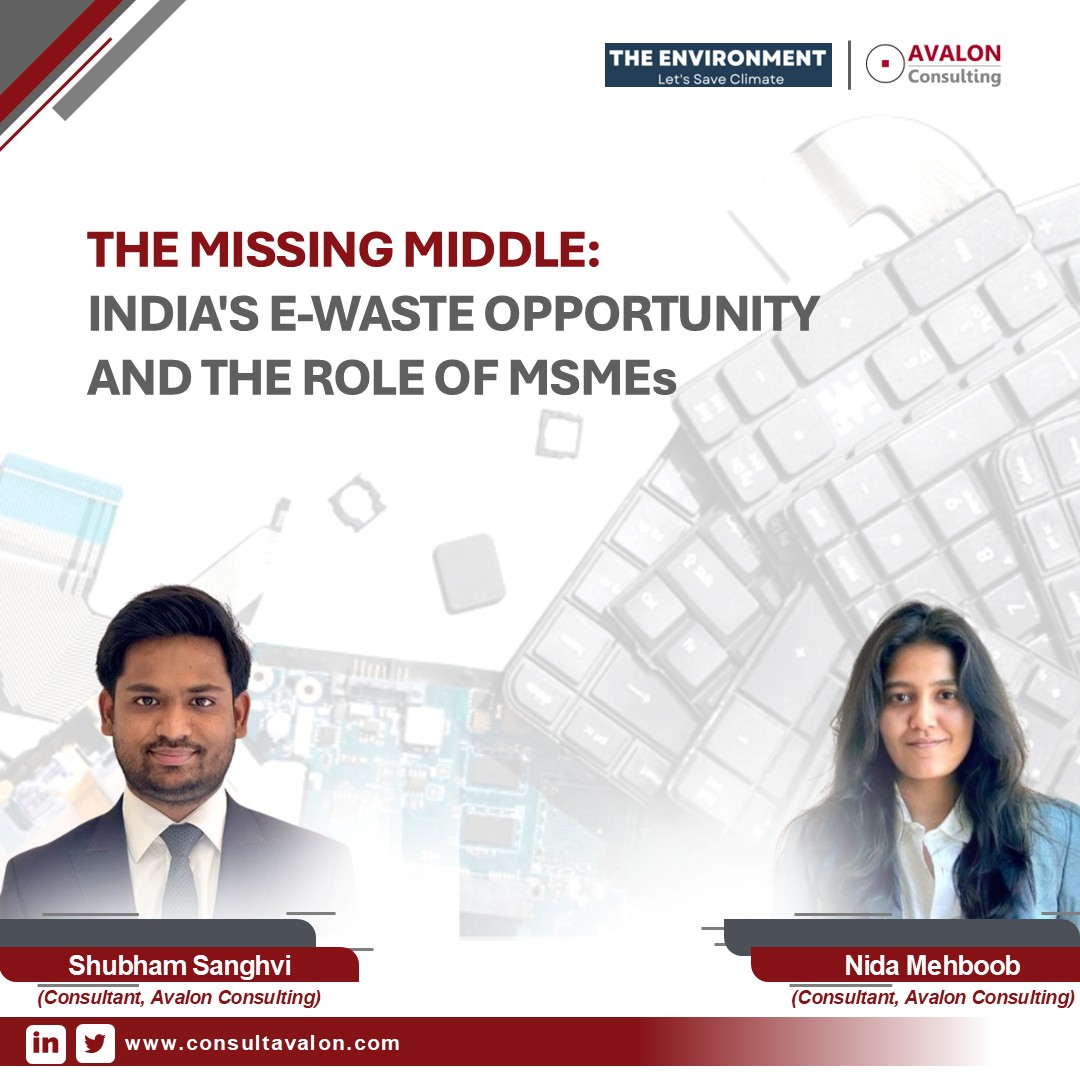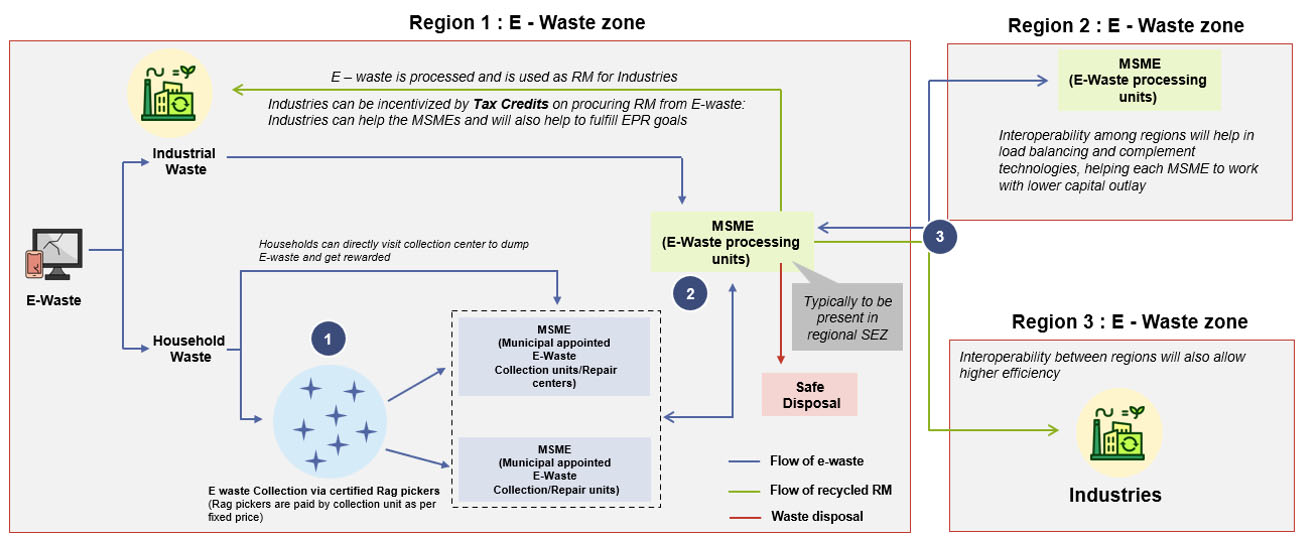Shubham Sanghvi and Nida Mehboob, Consultants at Avalon Consulting, shared their insights on “The Missing Middle: India’s E-Waste Opportunity and the Role of MSMEs”, published in The Environment.
They highlighted how MSMEs, despite limited resources, are pivotal in repair, collection, and safer handling of e-waste. While barriers such as high setup costs and complex compliance remain, they emphasized that focused measures including phased formalization, Right-to-Repair support, and e-waste clusters, can unlock significant circular economy potential and strengthen India’s sustainable waste ecosystem.

A Familiar Scene, A New Problem
Walk through any city lane in India and you’ll find a repair shop with a self-taught technician coaxing life back into an old mixer or cracked mobile phone—using the principle Indians rely on daily – Jugaad. This informal network of repairers and micro-entrepreneurs has extended the lives of electronics, helping families save money and avoid waste. It is a system built less on formal training and more on accumulated wisdom—where jugaad is both a philosophy and a way of doing business.
Yet, the scale of what’s now discarded is testing the limits of this repair-first culture. Recent government figures put India’s annual e-waste at nearly 1.75 million metric tonnes—a jump of nearly three-quarters in just five years. Most of this mounting waste never passes through the gates of a licensed recycler. Instead, it finds its way to informal handlers: MSMEs, small aggregators, or lone technicians who do their best, often without access to safe tools or proper disposal options. The result is predictable—rising environmental and health risks, and a missed opportunity for genuine circularity.
Why MSMEs Matter
With over 63 million micro, small, and medium enterprises across India, the sector already forms the backbone of the country’s economy—contributing close to a third of GDP and employing more than 110 million people. But beyond the numbers, it’s their embeddedness that counts. A mobile repair shop in Lucknow or a neighborhood scrap dealer in Coimbatore isn’t just a business—they are a trusted node in their community. It is here, in these ordinary spaces, that the potential for a more responsible e-waste ecosystem begins.
In practice, MSMEs are uniquely positioned to make an impact at four crucial points:
- Early Collection: Their proximity allows them to intercept unwanted electronics before they are dumped or lost.
- Waste Reduction: By offering low-cost repairs and candid end-of-life advice, they keep products working longer.
- Safer Handling: With even basic training and better equipment, many could manage hazardous components with far less risk.
- Employment: Repairing and recycling, when supported by access to finance and skills, can generate steady, respectable jobs at a local level.
But potential alone isn’t enough; persistent barriers keep MSMEs at the margins of the formal waste economy.
Barriers On-ground
Any MSME owner will tell you: setting up a basic recycling or repair unit can easily run ₹50–55 lakh, not counting the paperwork and approvals that may seem designed for much larger companies. Bank loans for such ventures are rare unless the entrepreneur already owns property. Then there is the 2022 E-Waste (Management) Rules—a document well-meaning in intent but labyrinthine in execution. Many small operators are left guessing about compliance, lacking both legal guidance and practical support.
Technology, too, is unevenly distributed. Most MSMEs still rely on manual dismantling, with advanced tools out of reach. The promise of Extended Producer Responsibility (EPR) payments has encouraged some to consider formalization, but when those payments are delayed or unclear, risk aversion wins. The system, in short, isn’t broken—it’s incomplete.
Three Ways Forward
- From Registration to Upgrading: A Realistic Path for the Informal Sector
Formal certification remains a distant goal for most informal recyclers. A more realistic path is to first help them register, then gradually support safety and environmental improvements. Municipal corporations are well-placed to coordinate this stepwise transition. Initiatives like Issuing permits, running training camps, and investing in neighborhood drop-off centers or small-scale shredders—can all make a difference.
- Making MSMEs End-of-Life Advisors, Not Just Repairers
For most Indians, deciding whether to repair or retire an appliance is less about rules and more about trust. MSMEs could play a powerful role as certified end-of-life (EOL) advisors, providing honest guidance on when to fix, when to sell, and when to recycle. This would require a policy push: mandating manufacturers to make parts, manuals, and diagnostics available to local shops under a Right to Repair framework, and accrediting these businesses as Certified Repair Partners. The impact? Fewer items discarded prematurely, more consumer trust, and a stronger local economy.
- E-Waste Clusters: Giving Small Players a Level Field
MSMEs lack the economies of scale that larger recyclers enjoy. This can be tackled by establishing e-waste processing clusters. These would be similar to SEZs i.e. designated zones with shared equipment, logistics, and compliance support. These hubs would allow MSMEs to aggregate material, reduce unit costs, and attract steady supply from businesses and bulk generators. Cities with strong manufacturing or tech sectors such as Hyderabad, Bengaluru, or Pune could be selected to pilot these clusters.

A Shared Mission for Policy and Industry
India’s Ministry of MSME has an opportunity to lead a “Green MSME Mission” focused on e-waste. The goal would be to register informal operators, fund community-level infrastructure, and make it easier for small businesses to access credit and technical know-how. For this mission to work, guidelines must be practical and backed by hands-on support—not just new paperwork.
At the same time, industry bodies like CII or MAIT have a role in developing Certified Repair Partner networks, building bridges between MSMEs and manufacturers, and launching “Green Employment Clusters” in partnership with local governments. Transparent, timely EPR mechanisms will give small players the confidence to invest and formalize.
Conclusion: No Time to Waste
India’s approach to e-waste has to consider the on-ground reality and the livelihoods already entwined in it. It requires a clear-eyed assessment of who already does the work and how best to help them do it safely and profitably. MSMEs, with their reach, and rootedness, are not the problem. They are the missing link. By supporting them through registration, upskilling, and genuine partnership; India can turn the complex scenario of e-waste recycling into an engine of local jobs, public health, and environmental progress. In the end, the question is not whether MSMEs will be part of the answer, but whether policy and industry are ready to uplift them and empower them to meet the bar.








